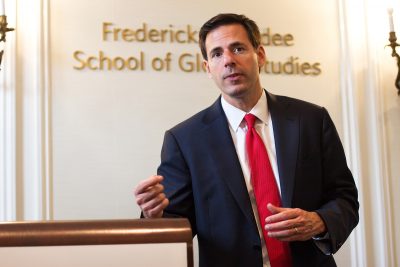
In the post-9/11 era, one of the Department of Justice’s main goals is to construct a barrier to combat international terrorism, U.S. Assistant Attorney General John Carlin told a room of attendees in the Boston University Frederick S. Pardee School of Global Studies Thursday.
Approximately 30 students, faculty and alumni assembled to listen to Carlin as he delivered a lecture on terrorism and various national security threats Thursday afternoon.
“A failure to share information across the law enforcement and intelligence divide had led to the death of nearly 3,000 people,” Carlin said, referring to the 9/11 attack. “It was something that couldn’t be repeated and had to be fixed.”
Carlin, nominated by President Barack Obama in 2014, said during the lecture that he currently oversees the DOJ National Security Division, a department that was created as a result of the catastrophic attack on American soil.
Today, cyber intelligence is integral to prevent terrorist attacks and to prosecute terrorists who are responsible for attacks, Carlin said.
“If you had told many of us in this field right after 9/11 that, 15 years later, we would’ve prevented al-Qaeda from committing another large-scale spectacular attack, people would’ve been surprised,” Carlin said.
He said there is no doubt in his mind that al-Qaeda and its affiliates still want to commit another “large-scale spectacular attack.”
Since the creation of the National Security Division, Carlin said, experts observed an increasing number of terrorist groups who used social media to spread fear and recruit new members. Carlin’s division, in turn, is employing a similar sense of creativity as a measure of counterattack, Carlin said.
Through working with technology and media-based companies that emphasize the importance of sharing vital information relative to terrorism, the division has been able to impose “real charges with real consequences,” Carlin said.
Rebecca Cowing, a Pardee alumna, said Carlin’s extensive knowledge of the subject was impressive.
“[Cybersecurity] is a topic that I don’t know too much about,” Cowing said. “It’s always useful to get different insight from people who know a lot.”
Michael Cavanaugh, a second-semester graduate student in Pardee, said he gained a greater understanding of cybersecurity at the federal level.
“I’m interested in national security issues, specifically cyber,” Cavanaugh said. “Over this summer, I worked for the [State of] New Jersey Office of Homeland Security [and Preparedness] in their cybersecurity division, so this would be a great event to get more background on what’s going on, on the federal level.”
Cavanaugh said attending a lecture by a major political figure like Carlin is an amazing opportunity for BU students.
“Any time you get a chance to come and see the assistant attorney general, it’s always something you’ve got to take advantage of,” Cavanaugh said. “He was a great speaker, knew the topics, plus the questions were great that came out of the audience.”
Satoe Sakuma, a senior in the College of Arts and Sciences, said the lecture focused on an interesting topic that should be talked about more often.
“It was a great blend between international relations and computer science,” Sakuma said. “It’s definitely an intersection that we need to explore more, and I’m glad that BU’s doing that.”




